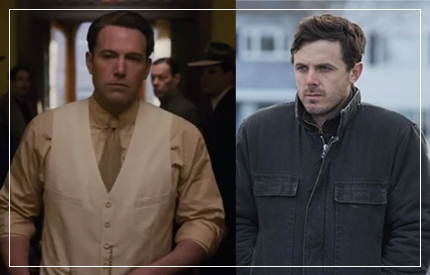Review: A Tale of Two Afflecks
Date: 26/01/2017
Movie Review

Ten years ago the studio adaptation of Dennis Lehane's Gone Baby Gone marked Ben Affleck's directorial debut and his brother Casey's breakthrough leading man role. Both brothers are back on screen this month, in movies of markedly different quality.
For Ben's writer-director-producer one-man-show Live by Night, he swerves back to Lehane's writing for a big-budget Depression-era crime epic about Joseph "Joe" Coughlin (Affleck), an outlaw who climbs to the top of the bootlegging business in Tampa, Florida by taking on the KKK. It's a big, ambitious story with violent passions, smothered by a lifeless production and baggy pacing.
This is Affleck's first solo script, after working with Aaron Stockard on screenplays for The Town and GBG, and it seems he could've done with an extra pair of hands to tame the novel's swooping arc, which includes location jumps, shifting allegiances and multiple lovers.
Affleck gives a performance for which the kindest description is "undirected". More costume than character, his Joe slumps around in badly tailored suits and silly fedoras, a posture of gangster cool, so laidback in his quiet menace that at times he seems to have forgotten the camera is rolling. The man appears bored by his own movie.
Chris Messina is at least having some fun as his right-hand man, and Elle Fanning brings ethereal knowingness as the cherubic preacher who threatens Joe's vice operation, but without the blood and bone of implied internal life, all the hand-rubbing about his moral quandaries leaves little impression.
This tonal uniformity, and the reliance on montage and catch-up narration to zip through plotting, means that a lot happens, but it feels like actually nothing much happens at all. Detached and self-satisfied, this Prohibition saga is a teetotal snooze.
Kenneth Lonergan makes films about the things that don't go away. In 2000's You Can Count On Me, the sudden orphaning of young siblings helps fashion an unsolvable divide between the two in adult life, while in Margaret, witnessing a fatal accident sends Anna Paquin's carefree teen spiraling in new directions.
His third feature as writer-director, Manchester by the Sea, part of Amazon Studios' effort to chase indie respectability, is Lonergan's most intensely refined work yet, a restrained but movingly humane portrait of tragedy's never-ending fallout.
Casey Affleck is Lee, a coiled loner living out a one-room existence as a janitor in Quincy, Massachusetts, whose brother's death (Kyle Chandler, a blackbelt in small-town decency) forces him to return to his seaside home, make the necessary arrangements and care for his teenage nephew (Lucas Hedges), to whom the stunned Lee has been handed legal guardianship.
Amidst the logistics of bereavement, Lee is forced to face his ex-wife (Michelle Williams) and the inconceivably horrible catastrophe that shattered their family life. Manchester is earning descriptions that toast its tear-jerking power, and Affleck's performance has, inevitably, been the subject of Oscar chatter, but this story lays out its emotion in a different register to what audiences may expect.
There is little showstopper hysteria for the Academy reel: here grief and pain find expression in silence and evasion. People linger in doorways, unsure, and conversations don't so much end as evaporate gently and uncomfortably into the air. Affleck has the ashen, scorched earth expression of a man already hollowed out by several lifetimes' worth of sorrow.
Typical of Lonergan's work, there is little in the way of resolution, catharsis or lessons learned: resistant to sentiment's soothing release, Manchester is a uniquely convincing drama about incompleteness of the human heart.
For Ben's writer-director-producer one-man-show Live by Night, he swerves back to Lehane's writing for a big-budget Depression-era crime epic about Joseph "Joe" Coughlin (Affleck), an outlaw who climbs to the top of the bootlegging business in Tampa, Florida by taking on the KKK. It's a big, ambitious story with violent passions, smothered by a lifeless production and baggy pacing.
This is Affleck's first solo script, after working with Aaron Stockard on screenplays for The Town and GBG, and it seems he could've done with an extra pair of hands to tame the novel's swooping arc, which includes location jumps, shifting allegiances and multiple lovers.
Affleck gives a performance for which the kindest description is "undirected". More costume than character, his Joe slumps around in badly tailored suits and silly fedoras, a posture of gangster cool, so laidback in his quiet menace that at times he seems to have forgotten the camera is rolling. The man appears bored by his own movie.
Chris Messina is at least having some fun as his right-hand man, and Elle Fanning brings ethereal knowingness as the cherubic preacher who threatens Joe's vice operation, but without the blood and bone of implied internal life, all the hand-rubbing about his moral quandaries leaves little impression.
This tonal uniformity, and the reliance on montage and catch-up narration to zip through plotting, means that a lot happens, but it feels like actually nothing much happens at all. Detached and self-satisfied, this Prohibition saga is a teetotal snooze.
Kenneth Lonergan makes films about the things that don't go away. In 2000's You Can Count On Me, the sudden orphaning of young siblings helps fashion an unsolvable divide between the two in adult life, while in Margaret, witnessing a fatal accident sends Anna Paquin's carefree teen spiraling in new directions.
His third feature as writer-director, Manchester by the Sea, part of Amazon Studios' effort to chase indie respectability, is Lonergan's most intensely refined work yet, a restrained but movingly humane portrait of tragedy's never-ending fallout.
Casey Affleck is Lee, a coiled loner living out a one-room existence as a janitor in Quincy, Massachusetts, whose brother's death (Kyle Chandler, a blackbelt in small-town decency) forces him to return to his seaside home, make the necessary arrangements and care for his teenage nephew (Lucas Hedges), to whom the stunned Lee has been handed legal guardianship.
Amidst the logistics of bereavement, Lee is forced to face his ex-wife (Michelle Williams) and the inconceivably horrible catastrophe that shattered their family life. Manchester is earning descriptions that toast its tear-jerking power, and Affleck's performance has, inevitably, been the subject of Oscar chatter, but this story lays out its emotion in a different register to what audiences may expect.
There is little showstopper hysteria for the Academy reel: here grief and pain find expression in silence and evasion. People linger in doorways, unsure, and conversations don't so much end as evaporate gently and uncomfortably into the air. Affleck has the ashen, scorched earth expression of a man already hollowed out by several lifetimes' worth of sorrow.
Typical of Lonergan's work, there is little in the way of resolution, catharsis or lessons learned: resistant to sentiment's soothing release, Manchester is a uniquely convincing drama about incompleteness of the human heart.





































